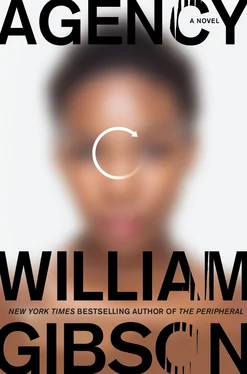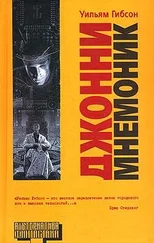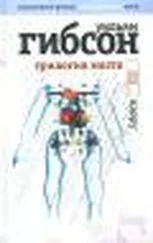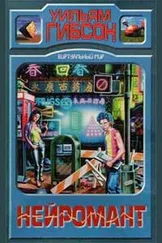He hoped Lev had arranged for chairs, rather than stalagmite stumps. He’d no idea what the six bot-girls were about. They struck him as very un-Lev.
“Hello,” said Lev, glumly extending his hand, from where he sat upon a stalagmite stump far too short for his long legs. Netherton briefly took it. “Have a seat there.” Indicating the nearest stump. Netherton settled himself on this, as uncomfortably as expected.
The bot-girls surrounded them, arms outstretched and palm to palm, smoothly adjusting distances from one to another, to press hands again and raise them toward the rough low ceiling. The sequins began to swirl, spiraling up, from one cloak to the next, to form a low dome of flitting light. “What’s this?” Netherton asked Lev.
“Privacy,” said Lev, “of an unusual but necessary order.”
“Provided by the bots?” Looking at their upraised cloaks.
“They’ve no connectivity whatever,” Lev said. “Like the robots in old films. Limited functionality, but what there is is provided exclusively by onboard AI. The cloaks, combined this way, comprise something akin to a Faraday cage, but blocking many more sorts of signal. Limited duration, though, operating at full spectrum, so I’ll be quick.”
“Do.”
“My father,” Lev said, “less than two hours ago, learned from an uncle of his, more highly placed, that your Lowbeer’s role is being reconsidered.”
“‘My’ Lowbeer, is she? You introduced us.”
“And you’ve since become her employee. Which is why I’m alerting you, now, to the possibility of that becoming unsafe.”
“Has it occurred to your father,” asked Netherton, taking a page from Lowbeer’s book, “that conspiring to hinder her in her work may be one of the least safe things anyone can possibly do?”
“Certainly,” said Lev. “As the klept’s resident antibody, she expects to be conspired against. My father, however, says he’s never before seen her regarded, at his uncle’s level, as other than the most necessary of evils.” He glanced up at the sequin swirl, then leaned forward, lowering his voice. “It’s to do with her manipulation of stubs.”
Netherton’s pet fear executed a squeamish rollover, seemingly atop his entire consciousness, bringing him a flashback of the Thames chimera he’d seen with Lowbeer. “It does?”
“She’s altering stubs to produce worlds in which the klept enjoy less power,” Lev said, absolutely confirming it for Netherton.
“It’s art, Lev,” Netherton protested, taking a second page from Lowbeer, “poetry. What happens in a stub stays there.”
“My father takes this very seriously, Wilf.”
Netherton looked up at the zero-connectivity redheads, serenely steepled, as far down the ladder from Flynne’s vintage Hermès mystery woman as was possible to go, short of simply being a statue. The sole tasty bit of their tech would be whatever provided the supposed privacy. “Where did you find these?”
“My father ordered me to use them,” Lev said. “He used them when he was told this, and again when he told me.”
“Would you be able to give me any more information, about this supposed threat?”
“Only that her role is being critically reconsidered.”
“Reconsidered?”
“As to whether it needs to exist.”
Netherton considered this. “Thank you. I assume I’ve your permission to tell her? Not that I’d be able to do otherwise, of course.”
“Of course. That’s why we’re telling you. But absolutely no one else. Your wife, for instance.”
“And that’s all you know?”
“It is,” said Lev.
“You look quite down,” said Netherton, “if you don’t mind my saying. Is it over this?”
“Hardly,” said Lev. “It’s my responsibility to tell you. Not least because you yourself might be in danger, as her employee. Otherwise, I’m really not up to much. Cheyne Walk’s definitely not agreeing with me.”
“I’m sorry.”
“Not your fault. Meanwhile, please inform Lowbeer, and no one other than Lowbeer, and then only in circumstances she herself deems entirely secure. She’ll have something far superior to these bots, but until you find yourself within her version of this charmed circle”—and he winced, the bot-girls being obviously not to his taste—“say nothing to anyone.”
“Time, sir,” said one of the bots, its voice identical to that of the one that had greeted Netherton at the foot of the stairs. “Two minutes remain.”
“We’re done,” Lev replied. As one, the six lowered their cloaks, sequins ceasing to whirl. Without looking back, they turned and walked toward the dining area, Netherton watching them go.
“You don’t like Cheyne Walk, then?” Netherton asked.
“It’s entirely uncles of mine,” Lev said, standing up. “You can’t imagine. My best to Rainey and your boy.” Turning, he walked toward the sound of popping champagne corks.
Verity came awake, startled semi-upright by a dream she immediately forgot, in a bed strangely wide, in a room wider still.
“You okay?” Virgil asked quietly, from behind the closed door to the other room.
“Yeah,” she managed. “Dream.”
“Sounded like it,” he said. “I’m up, if you need anything.”
“Thanks. I’m okay.”
Realizing she was in her mummy-bag liner, though she didn’t remember getting it before she’d crawled into bed. Still dark outside, to judge by the lack of light at the edges of the curtains. Groping gingerly around on the nearest bedside table for the glass of water she now remembered leaving there. Finding it, she drank half and lay back in the liner, under the Clift’s duvet. The traffic was quieter now. Don’t think about any of it, she advised herself, then decided that wasn’t working.
Getting up on an elbow, she propped herself with pillows and found the remote. The screen, opposite the foot of the bed, was as wide. She flipped through news channels, volume down. Fox seemed to still be mainly devoted to the president’s pre-election e-mails, but CNN and MSNBC looked as though they’d both been straight Qamishli for long enough to see it under the presenters’ eyes. She stopped when she saw the president, speaking from yet another podium. Reminding her of everything she’d just advised herself not to think about, so she turned off the television, shoved the pillows around, curled up in the familiarity of the mummy-bag liner, and fell asleep.
60
Regard of the Adjustor
Turning into Alfred Mews, Netherton glanced down its length to the windows of their flat. He walked toward them, waiting for Lowbeer’s car to partially decloak. When it did, he stepped past and turned, to face what he hoped was where he’d last seen its door. “May I come in?”
“Certainly,” said Lowbeer, the door appearing just to the left of where he’d expected it, along with a surrounding hand’s-width of glossy black bodywork, the decloaked segment unevenly pixelated along its edges. The door opened, its step folding down. He stepped forward, up, and into the glow of a single stout white candle, centered on the table in the carpeted pit. Behind him, the door quietly closed.
“White iris and vetiver,” Lowbeer said. “I hope you don’t mind.”
“Very nice,” said Netherton, having learned to take a degree of comfort in her candles, not for their scents but for the touch of dotty old lady they lent her, however deceptively. “I’ve a question.”
She was in shirtsleeves, a rare circumstance but not unheard of, her necktie undone. “Yes?”
“How private is this?”
“Security was the central goal, in the design of every aspect of this vehicle,” she said, “but you’ve no reason to be concerned when you’re with me in any case, wherever we are.”
Читать дальше








